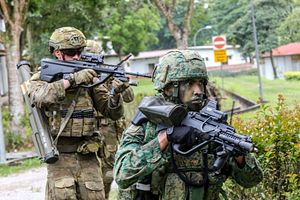On Monday, Australia and Singapore signed a new military training agreement. The development marked another inflection point in the ongoing development of the defense aspect of the broader bilateral relationship between the two Asian states amid wider domestic and regional changes at play.
As I have noted before in these pages, Australia and Singapore have long maintained a security relationship as part of their wider ties, which were elevated to a level of a comprehensive partnership back in 2013. The relationship has continued to deepen over the past few years amid lingering challenges, with developments within defense ties such as the upgrading of existing military exercises and exchanges and the launch of new a new dialogue on regional and security issues.
One key aspect of that relationship is the fact that Australia is among the important places where the Singapore military has conducted overseas training, which it considers critical for its development. Over the past few years, Singapore has been looking to make further advances in this area of the relationship in consultation with Canberra amid changes in its own defense outlook, the regional security environment, and changes of government in Australia itself.
This week, this realm of the relationship was in the headlines again with the signing of a new agreement on military training. The agreement was signed on March 23 by the defense ministers of both countries as part of a wider meeting between their leaderships.
The Treaty on Military Training and Training Area Development in Australia was signed by Singapore Defense Minister Ng Eng Hen and Australian Defense Minister Linda Reynolds and witnessed by Prime Minister Lee Hsien Loong and Australian Prime Minister Scott Morrison during the 5th Singapore-Australia Leaders’ Meeting. The meeting was conducted video conference in view of the global coronavirus pandemic, and the signing occurred at the Ministry of Foreign Affairs in Singapore and the Parliament House in Canberra, Australia, respectively.
The new treaty is not without significance for the defense aspect of the relationship and ties more generally. Strategically, Singapore’s defense ministry (MINDEF) characterized it as “an upgrade” of the bilateral memorandum of understanding on Military Training and Training Area Development in Australia, signed in 2016 under the Singapore-Australia Comprehensive Strategic Partnership.
And at a more operational level, the treaty will facilitate enhanced military training access for the SAF in Australia as well as the joint development of military training areas in an expanded Shoalwater Bay Training Area and a new Greenvale Training Area in Queensland, including combined arms air-land ranges and urban operations live-firing facilities. Per MINDEF, following the completion of these facilities, the SAF will be able to conduct integrated training across all three services for up to 18 weeks, involving up to 14,000 personnel annually, for 25 years in training areas approximately 10 times the size of Singapore.
With the signing of the treaty now complete, the focus will naturally shift to follow on activities – especially with the SAF marking the 30th anniversary of SWBTA training in October this year – as well as how both sides will implement the treaty more generally in the coming years. As these developments occur, they will be important to monitor to assess how this development impact the defense relationship as well as ties more generally between the two countries.

































